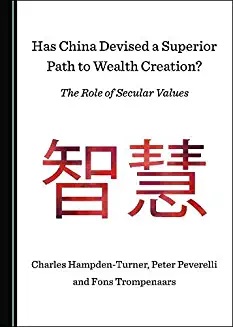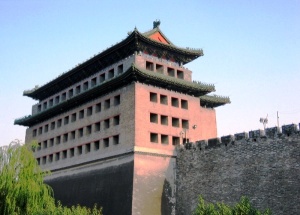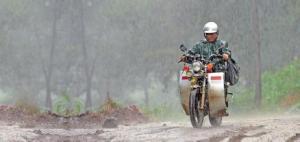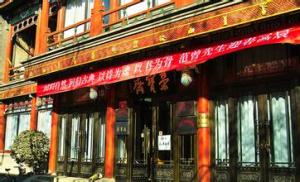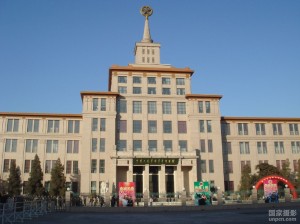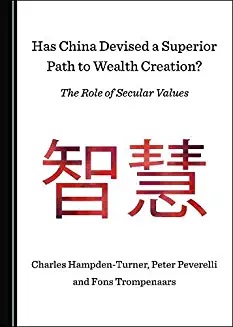Wednesday, July 28, 1976, 4:00 am: earthquake. Spent all day outside the building, only went up shortly in the afternoon to pack. Slept in room 218 that night.
That is an extremely terse and factual description of what happened that final day of my year in China. Few of you will have realized that I am referring to the 1976 Tangshan earthquake, one of the worst in human history. This was a disaster comparable to the eruption of the Vesuvius as described by Pliny. Tangshan, the industrial city north of Tianjin, was almost completely wiped off the map, like Pompeii was in the first century BC.
Here is a Chinese compilation of the quake in its epicentre, Tangshan.
The two pictures in this post show Deshengmen, one of the few remaining city gates of old Beijing right after the earthquake and in its current state.
You should also pay attention to the time of the day. At 4 am we were all fast asleep.
. . . Who on earth was knocking on my door at that hour?
I vividly remember that I was dreaming that someone was knocking on our door. He or she was knocking so fiercely, that it made the entire room shake. When I slowly opened my eyes, the room was indeed shaking, but so was the entire world.
Wang Fuchen was born and raised in a region frequently, at least once a year, plagued by earthquakes. They were usually small ones, like the regular seismic activity in the Tokyo area. Shenyang people had grown used to those shakes, and remained calm during weak tremors and at most hid under a table or something, during the stronger ones.
Gradually waking up, I saw Wang standing up in the room, looking outside the window, saying: ‘It’s an earthquake’, in the same factual way in which he had announced that he had had a little too much to drink, a couple of weeks earlier. At hindsight, I realize that it was my luck to share a room with someone who was familiar with this phenomenon and therefore retained his composure. Wang was not easily agitated anyway.
The scene outside was fascinating and terrifying nonetheless. The earth was not so much shaking, but seemed to undulate like a sea in heavy weather. Our window looked out on the playground in the center of the campus. That put us in a prime position to observe what ‘earthquake’ means in practice. It was my first, and even Wang had never experienced one like this . . .
I remained quite calm as well. After the waves and shocks had ceased, I dressed, took all my money, my passport, and my newly acquired ticket home and exited our room. By that time, the noise in the hallway had been increased rapidly. Some students had panicked and left their room immediately, without taking hardly anything.
. . . When I descended the stairs, I had the privilege of seeing Torge’s bare butt moving around ahead of me. Apparently, he used to sleep naked, being a creature of a cold climate.
He had his underpants in his right hand and when he had almost reached the ground floor, stopped to slip it on. He then went down the last section of the stairs, and we were outside.
That early morning saw an odd collection of people gathered in front of the main entrance of our building.
Some of us, like me, were dressed for the day, while others, like Torge were hardly dressed at all. José, the Spanish student had draped a sheet around his body, which made him look like one of the citizens of Pompeii who tried to flee for the falling debris, only to get incinerated a few minutes later by a superheated burst of volcanic gas. . .
Gradually, some of the school officials appeared. We were told to go to the dining hall and await further notice. As if the commotion caused by the earthquake was not enough, it also started to rain.
The phone lines had not been damaged and all of us could get in contact with our own embassies during the morning, to assure them that we were safe. The embassy staff wired that message forward to the home office, which would inform our next of kin.
After having spent a few hours in the dining hall, we started to get bored. During the few moments that it did not rain, we went out for a stroll along the campus, to inspect the damage to the buildings with our own eyes. Actually, there was hardly any visible damage done. A piece of good luck was that, because of the rain, it was cooler than usual that day.
. . .That morning we saw a young couple sharing one chair, probably the one piece of furniture they probably had taken from their campus apartment. The man was sitting on the chair, and his wife, whom we knew as one of the non-teaching staff members, was sitting on his lap.
She was quite chubby and always cheerful, and this time too she was visibly enjoying all the commotion. Even an earthquake could have a bright side. It was a diversion from the bleak daily routines. . .
The rain withdrew gradually, later in the afternoon. We were tired, bored and hungry. And for those of us who were set to depart the following day, there was still the issue of packing our suitcases.
A school official came to tell us that we, the students living in the top floor of our dormitory, would be allowed to pack our stuff and move it to rooms at a lower floor in our building. We could sleep there, as it was deemed safer than sleeping in the fourth floor, with its cracked walls.
. . . I had arrived in China with as much luggage as I was allowed to carry with me. After all, I had to prepare for an entire year in region with four very distinct seasons.
From the previous chapters, even the least attentive reader should have noticed that I had spent considerable time shopping. It is therefore amazing that I was still able to fit everything in my suitcase and carry-on luggage. . .
I did leave some stuff behind for Wang Fuchen, though, and also sold a few items to the Friendship Store.
. . .The Second Hand Goods Section had an official price list, but you would rarely receive the price that you were entitled too according that list. The store people would always deduct something for each of the flaws they had discovered. . .
I was happy with whatever I could get, as I did not intend to take the cumbersome thing back. Wang would not be able to buy it from me and I was not allowed to give it to him as a present. In both cases, I would have to pay import duty, because I was supposed to exit China with exactly the same goods as had registered when entering the country. . .
I also threw away some clothes, as the dining hall food had not been good for my waist line.
Chris also packed his stuff in the adjacent room, and so were a few others who would be leaving soon too, but were not allowed to stay in their room on the fourth floor either.
. . . It was an awkward feeling, leaving the room. This was the room that I had been occupying since September 13, 1975. I had spent so many nights on that bed, did so many things sitting on that chair, behind that tiny desk, with that bookcase on my right. It was cramped, but it had been my home, my retreat from the noisy and crowded city outside. . .
Because of the earthquake, I was forced to spend my final night in the school in a strange room. Even though all rooms did look alike, that night felt like sleeping in a hotel.
Either in spite of or due to the emotions of that day, I slept very well.
If you like this story and would like to read all of it, you are invited to buy the book. Benelux citizens can order a copy, signed if needed, directly with the author. Others can order it at Amazon.
